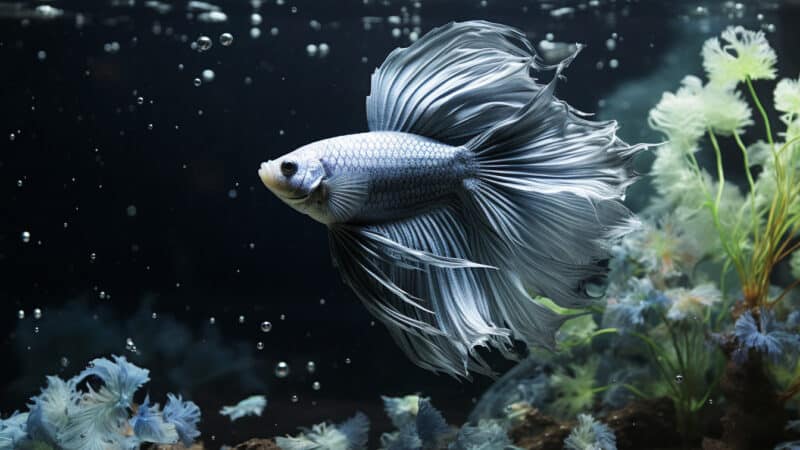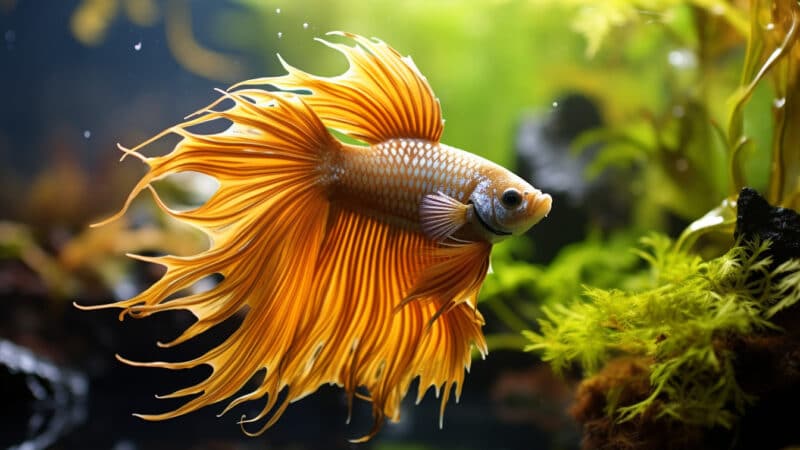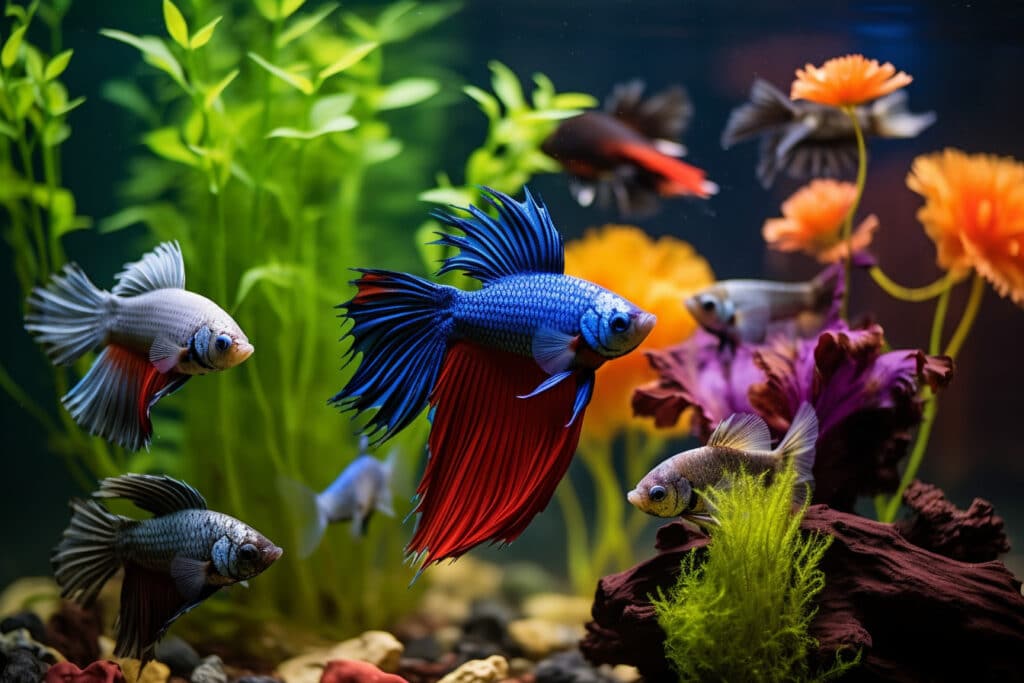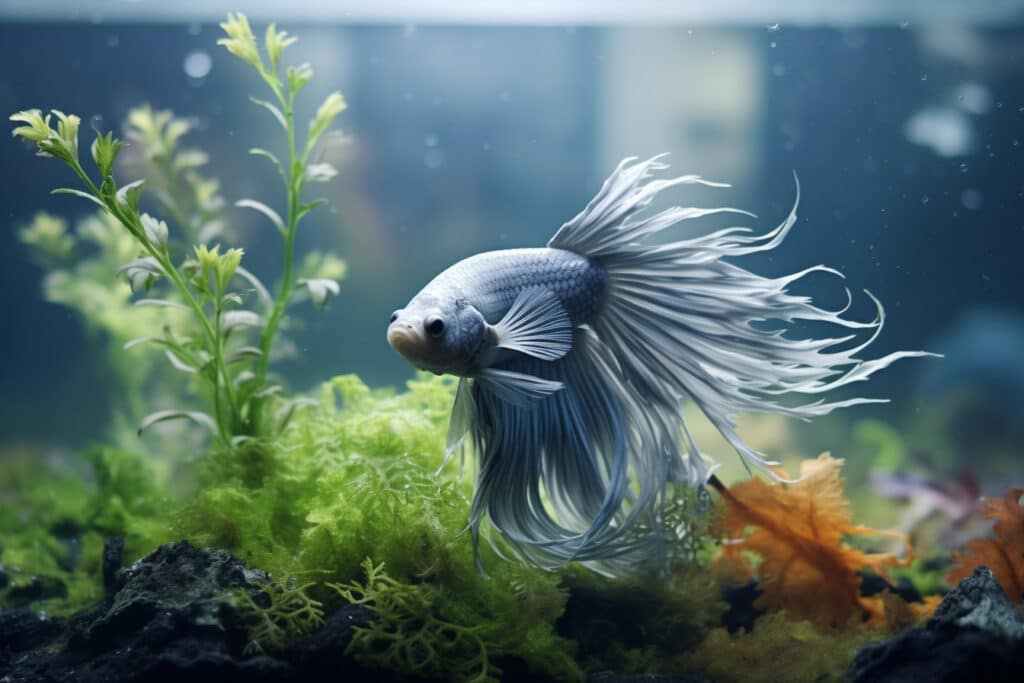Do Betta Fish Get Lonely?
A common question arises among new Betta fish owners: “Do Betta fish get lonely?”
Betta fish, also known as Siamese fighting fish, are a favorite among both novice and expert fishkeepers, offering a unique blend of beauty and personality in the aquatic world, As we dive deeper into this article, we aim to address this question and shed light on the intricate social dynamics of these fascinating fish.

Table of Contents 🦑
Do Betta Fish Get Lonely or Bored?
Determining the emotional state of a fish might not be as straightforward as with more expressive pets, but there are clear indicators of a Betta’s well-being and happiness. Here’s how you can gauge if your Bettas are content or distressed:
Signs of a Happy Betta Fish
Active Exploration: A content Betta is often seen swimming around the fish tank, exploring its environment, especially after a change in their habitat, like after cleaning or rearranging the tank.
Healthy Appetite: A Betta that eagerly comes to the surface to feed and consumes its food with vigor is typically in good spirits.
Bright and Vivid Coloration: When a Betta is content and healthy, its colors are vibrant and pronounced.
Bubble Nests: Male Bettas create bubble nests on the water’s surface. While it’s primarily a sign of breeding readiness, it’s also often interpreted as an indication of contentment.
Interactive Behavior: Happy Bettas may respond to their owners by coming closer to the glass when someone approaches the tank or following a finger moved along the tank’s exterior.
Consistent Breathing: A Betta’s gills should move steadily and not too rapidly. Fast, labored breathing can be a sign of stress or illness.
Signs of an Unhappy or Stressed Betta
- Lethargy: If your Betta spends excessive time lying at the bottom of the tank or hiding without much activity, it may be stressed or unwell.
- Loss of Appetite: A Betta that consistently refuses food might be stressed or sick.
- Dull or Fading Colors: Stress or poor health can lead to your Betta losing its vibrant coloration.
- Clamped Fins: If a Betta’s fins are consistently clamped close to its body, rather than spread out, this can indicate stress or illness.
- Spotting or Scratching: If your Betta rubs itself against objects in the tank or has visible spots or patches, it might be experiencing discomfort or parasitic infections.
- Erratic Swimming: If your Betta swims in an uncoordinated or erratic manner, it could be a sign of stress, water quality issues, or health problems.
Remember that while these signs provide guidelines, every Betta has its unique personality and behavior. Regularly observing your Betta and familiarizing yourself with its normal behavior will help you quickly detect any changes, allowing for timely interventions if needed. Always maintain optimal water quality, provide a stimulating environment, and offer a balanced diet to ensure your Betta’s well-being.

Understanding The Natural Behavior and Habitat of Betta Fish
To truly understand the nature of Betta fish and the question of their loneliness, it’s imperative to explore their origins and natural habitats. Betta fish are tropical fish and native to the vast waterscapes of Southeast Asia, particularly in countries like Thailand, Cambodia, and Vietnam.
What stands out most prominently about their natural behavior is their inherent solitary nature. In the wild, male Betta fish are fiercely territorial. They stake out their own space, often a patch of underwater vegetation or a chosen corner of a stream, and defend it vigorously against intruding males. These territorial disputes, characterized by vibrant displays of fin flaring and intense circling, rarely result in physical harm but rather act as a show of strength and dominance.
Conversely, female Betta fish, while less aggressive, They tend to lead solitary lives. Outside of brief interactions during mating, they do not exhibit strong social tendencies, further underscoring the individualistic nature of this species.
Thus, understanding the Betta fish’s natural habitat and behavior gives us a foundational perspective when addressing their social needs in captivity.
What Makes Bettas Prefer Solitude in Their Environment?
Betta fish’s contentment with solitude is rooted in their natural behavior, evolutionary history, and habitat. Here’s why Bettas often thrive when living alone:
Natural Territoriality
In the wild, male Betta fish are fiercely territorial. They stake out their own space, often guarding a chosen territory like a patch of underwater vegetation, and defend it from other male Bettas. This territorial nature ensures they have access to resources like food and prime breeding spots. When another male enters this space, aggressive displays, and sometimes confrontations, ensue to establish dominance.
Breeding Behavior
Their solitary nature is also linked to their breeding behavior. Male Bettas create bubble nests on the water’s surface. When a female is ready to breed, she approaches a male’s territory. After breeding, the male chases the female away to protect the eggs he places in the bubble nest. This behavior further emphasizes their preference for solitary spaces.
Avoidance of Stress
In confined spaces like aquariums, the presence of other male Bettas or aggressive fish can be a constant source of stress for a Betta fish. Prolonged stress can lead to weakened immunity, increased susceptibility to diseases, and shorter lifespans. Living alone eliminates these territorial disputes and associated stressors.
Safety from Fin Nippers
Betta fish, with their flowing fins, can become targets for fin-nipping fish. In a community tank, if not paired with the right species, their long fins might attract unwanted attention, leading to injury.
Consistency in Environment
Bettas thrive in stable environments. When alone, there are fewer variables affecting water quality, such as waste from other fish. This consistency can be beneficial for their health and well-being.
Evolutionary Habitat
Their natural habitats in Southeast Asian rice paddies, ponds, and slow-moving streams often have low fish densities. In such environments, interactions with other Bettas or potentially aggressive fish are infrequent, allowing them to lead largely solitary lives.
While Bettas are content living as a solitary fish , this doesn’t mean they don’t benefit from stimulation. A well-decorated tank with hiding spots, plants, and occasional interaction (like mirror exercises for short durations or training) can keep them engaged and mentally stimulated.
Are Betta Fish Compatible with Other Aquatic Species?
Yes, Betta fish can live with other fish, but careful consideration is needed to ensure compatibility and reduce potential conflicts. Here’s a guide to understanding and ensuring peaceful cohabitation:
Tank Size and Environment: A large tank provides more space for territories and reduces the chances of aggression. Make sure the tank has plenty of hiding spots, plants, and decorations to offer refuge and reduce territorial disputes.
Compatible Tank mates: Opt for non-aggressive species that do not resemble Bettas in appearance. Ideal companions might include:
Corydoras catfish: Peaceful bottom dwellers.
Ghost and cherry shrimp: Though small, they can coexist well if given hiding spots.
Snails: Like the Nerite or Mystery snails.
Some rasboras and tetras: They’re small, peaceful, and fast enough to evade a Betta if needed.
Avoid Fin Nippers: Certain fish species, like tiger barbs or some tetras, are known to nip fins, making them unsuitable tankmates for Bettas, which have long, flowing fins.
Avoid Flashy and Brightly Colored Fish: Fish with bright colors or long, flowing fins might be mistaken as rival Bettas. Examples include guppies, which might provoke the Betta’s aggression.
Monitor Temperature and Water Conditions: Betta fish thrive in warmer water, around 76-82°F (24-28°C). Ensure that any tankmates have similar temperature preferences and water parameter needs.
Behavioral Observation: Once other fish are introduced, monitor interactions closely, especially in the early stages. Look for signs of aggression or stress from any of the tank inhabitants.
Have a Backup Plan: Be prepared to intervene if signs of prolonged aggression or bullying appear. This could mean having a separate tank or divider on hand to separate the Betta if needed.
Avoid Overcrowding: An overcrowded tank can lead to increased stress and aggression. It’s essential to ensure that the tank’s size is appropriate for the number and species of fish you’re keeping.
Feeding Considerations: Make sure all fish get their fair share of food. Bettas are surface feeders and might outcompete slower or shyer fish for food.
In summary, while Bettas are known for their solitary nature, with careful planning and consideration, they can coexist with other fish in a community setting. It’s essential to prioritize the well-being of all tank inhabitants and be observant to ensure a harmonious environment.

Is It Possible for Female Bettas to Coexist Peacefully in the Same Tank?
Yes, female bettas can live together under specific conditions, and such setups are commonly referred to as “Betta sororities.” However, there are important considerations and precautions to take when attempting this:
Tank Size: A large tank is essential for a successful Betta sorority. A minimum of 20 gallons is recommended, but bigger is generally better. A spacious tank allows for each female to establish her own territory, reducing potential conflicts.
Number of Females: It’s usually recommended to have at least 5 or more female Bettas if you’re setting up a sorority. This helps spread out any aggression, preventing a single fish from becoming the primary target of bullying.
Environment: The tank should have plenty of hiding spots, live plants, caves, and decorations. This provides each Betta with her own territory and gives them places to retreat if they feel threatened.
Monitoring: Even with the best setup, it’s vital to monitor the fish closely, especially during the initial days. While female Bettas are generally less aggressive than males, they can still display territorial behaviors. Look out for excessive chasing, nipping, or any other signs of prolonged aggression.
Introducing Together: It’s a good idea to introduce all the females to the tank at the same time. This prevents any single Betta from establishing a territory and then becoming aggressive toward newcomers.
Backup Plan: Always have a backup plan. Despite your best efforts, a Betta sorority might not work out. Be prepared to separate the females into different tanks or sections if aggression becomes uncontrollable.
Tankmates: If you plan to have other species with the Betta sorority, choose peaceful, non-aggressive, and non-fin-nipping species. It’s also wise to avoid fish with bright colors or long fins, as they might be mistaken for other Bettas and provoke aggression.
Consistent Observation: Even if the sorority seems peaceful initially, dynamics can change. Regularly observe the females for any signs of stress, injury, or increased aggression.
Regular Maintenance: Regular tank maintenance, including water changes and water parameter checks, is crucial to reduce stress and keep a healthy environment.
In conclusion, while female Bettas can coexist in a sorority setup, it’s not a completely natural situation for them. A Betta sorority requires careful planning, consistent observation, and a willingness to adjust as necessary.
In Conclusion Do Betta Fish Get Lonely?
Betta fish, with their vibrant colors and graceful movements, are not just beautiful additions to our homes, but sentient beings with their own sets of needs and behaviors.
While they might not experience emotions or sensations like humans, they certainly react to their environment, seeking stimulation and comfort.
Ensuring a varied, clean, and interactive habitat for your Betta not only enhances its well-being but also provides you, the owner, with the joy of observing a thriving and active aquatic companion.
By understanding and addressing the needs of these splendid fish, we foster a harmonious coexistence that benefits both the Betta and the aquarist.
We hope we answer to your question “Do betta fish get lonely”.
Related Blog Posts:

How to Keep a Betta Fish Happy
Swim To 🤿 Home How to Keep a Betta Fish Happy Are you a proud

Why Is my betta fish not eating
Swim To 🤿 Home Why Is My Betta Fish Not Eating Why is my betta

Betta Fish Behavior Before Death
Betta Fish Behavior Before Death, Betta Fish Behavior Before Death: recognizing end-of-life signs, learn the
